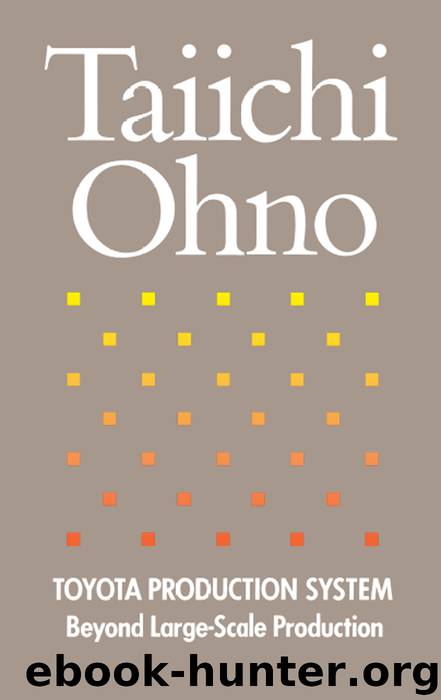Toyota Production System by Taiichi Ohno

Author:Taiichi Ohno
Language: eng
Format: epub
Publisher: Taylor and Francis
Published: 1988-04-15T00:00:00+00:00
► Take Good Care of Old Equipment
Does the value of equipment really go down? In the case of a worker, years of experience add depth and the worker’s value to the company. A machine, lacking human qualities, is discarded after giving long service. I want to advocate that, like workers, machines that give long service should be used with great, great care.
The language of business economics talks of “depreciation,” “residual value,” or “book value” — artificial terms used for accounting, tax purposes, and convenience. Unfortunately, people seem to have forgotten that such terms have no relevance to the actual value of a machine.
For example, we often hear: “This machine has been depreciated and paid off, and, therefore, we can discard it any time without loss,” or “The book value of this machine is zero. Why spend money on an overhaul when we can replace it with a new, advanced model?”
This kind of thinking is a big mistake.
If a piece of equipment purchased in the 1920s is kept up and can guarantee, at present, an operable rate close to 100 percent and if it can bear the production burden placed on it, the machine’s value has not declined a bit. On the other hand, if a machine purchased last year has been poorly maintained and produces at only half its operable rate, we should regard its value as having declined 50 percent.
A machine’s value is not determined by its years of service or its age. It is determined by the earning power it still retains.
When replacing old equipment, we can look at it economically in different ways. We can compare cost analyses or interest on investment. But can such methods that appear so logical really be used in a plant? We must not lose sight of the fact that these methods are based only on premise.
For example, some people think conventional maintenance is the only way. Then they decide that absolute loss can only be based on several premises. In practice, however, these methods cannot even be used as standards. Despite this, faced with a poorly maintained, deteriorating machine, they apply these methods and conclude it would be better to replace the machine. This is completely irrational.
How, then, should we decide whether or not to replace an old machine? My conclusion is that if adequate maintenance has been done, replacement with a new machine is never cheaper, even if maintaining the older one entails some expense. If we do decide to replace it, we should realize that we have either been misled by our calculations and made the wrong decision or that our maintenance program has been inadequate.
When we lose an economic argument, we then argue the validity of replacement by saying “it is too difficult to restore the needed precision” or “we want to overhaul it but have no substitute machine.”
This reasoning is unsound. It shows we want new machines because we don’t have a better idea. When replacing aged equipment, we should always decide case by case.
Whether overhauled or
Download
This site does not store any files on its server. We only index and link to content provided by other sites. Please contact the content providers to delete copyright contents if any and email us, we'll remove relevant links or contents immediately.
Whiskies Galore by Ian Buxton(40328)
Introduction to Aircraft Design (Cambridge Aerospace Series) by John P. Fielding(32338)
Small Unmanned Fixed-wing Aircraft Design by Andrew J. Keane Andras Sobester James P. Scanlan & András Sóbester & James P. Scanlan(32141)
Craft Beer for the Homebrewer by Michael Agnew(17445)
Turbulence by E. J. Noyes(7037)
The Complete Stick Figure Physics Tutorials by Allen Sarah(6638)
Kaplan MCAT General Chemistry Review by Kaplan(6053)
The Thirst by Nesbo Jo(5785)
Bad Blood by John Carreyrou(5768)
Learning SQL by Alan Beaulieu(5409)
Weapons of Math Destruction by Cathy O'Neil(5036)
Man-made Catastrophes and Risk Information Concealment by Dmitry Chernov & Didier Sornette(4735)
iGen by Jean M. Twenge(4702)
Digital Minimalism by Cal Newport;(4540)
Life 3.0: Being Human in the Age of Artificial Intelligence by Tegmark Max(4506)
Audition by Ryu Murakami(4098)
1,001 ASVAB Practice Questions For Dummies by Powers Rod(4038)
Electronic Devices & Circuits by Jacob Millman & Christos C. Halkias(4027)
Pale Blue Dot by Carl Sagan(4001)
